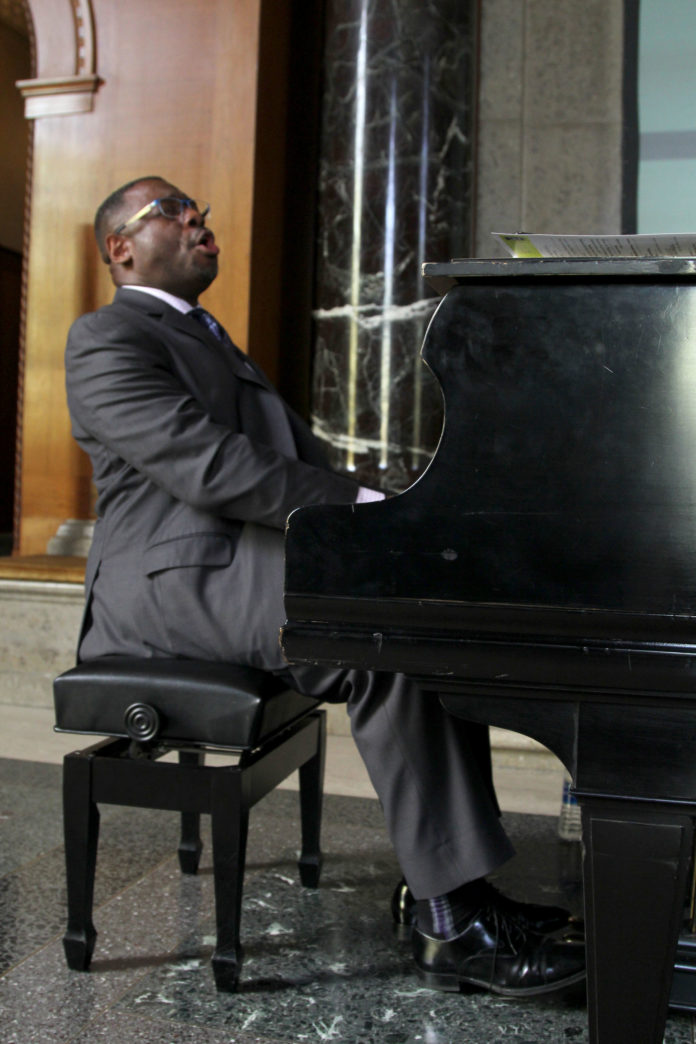
By Cameron Bocanegra | Reporter
The Pruit Symposium brought attention to a powerful message with “Singing the Sermon: When the Message and Music Matter.” The event was held Thursday and Friday at Baylor’s Armstrong Browning Library and George W. Truett Theological Seminary.
The symposium focused on the importance of appreciating and restoring black gospel music that were transformed from original sermons to songs.
To end the symposium’s first day of celebration on Thursday, Stephen Newby, a professor from Seattle Pacific University and featured keynote speaker on “A Theology of African American Sacred Song and Liberation,” led a Gospel Sing at Greater Ebenezer Baptist Church. He had the entire room on their feet, singing and praising and also expressing the necessity of black gospel music to connect a community in worship.
“Lifting up this genre of music and bringing it into counterpoint conversations collects different ideas from each speaker, each one a different melody that come together to make new harmony and dissonance,” Newby said.
Robert Darden, Baylor professor of journalism, partnered with Baylor Libraries to create the Ray I. Riley Digitization Center after philanthropist Charles Royce offered to fund the Black Gospel Music Restoration Project. Royce was inspired to fund the project after reading Darden’s 2005 column in The New York Times about his concerns with foundational gospel songs fading away. Restoration of black gospel music by Baylor has been in progress for 10 years now, and the collection has more than 11,000 items with nearly half of them featured online.
“Between the 1940s and 1970s, about 70 percent of black gospel music was lost because of copyright issues, the civil rights movement and racism — all during the golden age and greatest power [during] the American black drive in gospel music,” Darden said. “If we let this music die, then future generations are going to be harsh.”
The second day of panelists on Friday included a case study on singer Fantasia Barrino. The lecture was titled “Somebody Oughta Testify: Black Women, Sacred Music, and the Significance of Social Mediated Testimony,” and it was presented by Ambre Dromgoole, a PhD student in religious studies at Yale University.
“Women have the ability to combine secular and spiritual parts in gospel music,” Dromgoole said. “It is empowering, rather than profane. It is divine in gospel style even if the lyrics are not sacred.”
“Rev. A. W. Nix and the Recorded Sermon: 1927-1931” was presented by Terri Brinegar, who addressed how the pair of preaching brothers, Andrew and William Nix, influenced the musician Thomas A. Dorsey eventually led to Dorsey’s conversion to a leader in gospel music and composition. Brinegar, a researcher of vocal styles from Florida University, corrected misconceptions by pointing out vocal differences and traditional qualities of black vocality that restores A.W Nix as an influence and exemplar of those traditions.
“The truth just has to be determined through this research,” Brinegar said. “This kind of music research brings so many people together regardless of skin tone, ages, backgrounds and denomination so that we can all celebrate as one.”
The conference concluded with the presenter’s panel recognizing the speakers: Melvin Butler, an ethnomusicologist; Dr. Deborah Smith Pollard, a professor of English literature and humanities at University of Michigan-Dearborn; Jerry Zolten, a roots and pop music historian; Corretta Pittman, historian of African American injustice; Ambre Dromgoole, researcher of religious studies; Terri Brinegar, classical music scholar; Lauren Nash and Andrew Virdin, researchers of Harlem Renaissance; and Dr. Stephen Newby, director of composition at Seattle Pacific University.
They joined together to recognize their humbling and educational experience, reminding one another that there is more research to be done and it is needed more than ever.
“When I was a kid, all I knew was this music,” Darden said. “I heard gospel through the radio every day and it never left my heart, and it’s the same with others. We’re going to make sure it’s never forgotten.”





